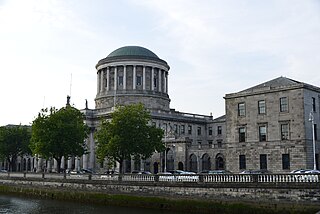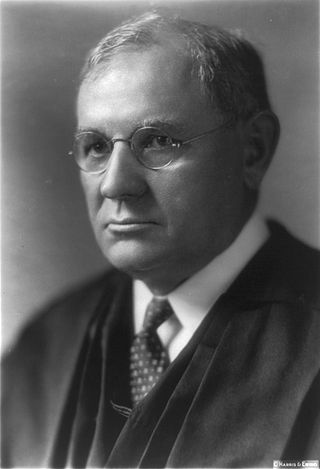Related Research Articles

A judge is a person who presides over court proceedings, either alone or as a part of a panel of judges. In an adversarial system the judge hears all the witnesses and any other evidence presented by the barristers or solicitors of the case, assesses the credibility and arguments of the parties, and then issues a ruling in the case based on their interpretation of the law and their own personal judgment. A judge is expected to conduct the trial impartially and, typically, in an open court.

The United Kingdom has three distinctly different legal systems, each of which derives from a particular geographical area for a variety of historical reasons: English law, Scots law, Northern Ireland law, and, since 2007, calls for a fourth type, that of purely Welsh law as a result of Welsh devolution, with further calls for a Welsh justice system.

Cearbhall Ó Dálaigh was an Irish Fianna Fáil politician, judge and barrister who served as the fifth president of Ireland from December 1974 to October 1976.

The Four Courts is Ireland's most prominent courts building, located on Inns Quay in Dublin. The Four Courts is the principal seat of the Supreme Court, the Court of Appeal, the High Court and the Dublin Circuit Court. Until 2010 the building also housed the Central Criminal Court; this is now located in the Criminal Courts of Justice building.

The coat of arms of the United Kingdom are the arms of dominion of the British monarch. They are both the personal arms of the monarch, currently King Charles III, and the arms of the state. In addition to the monarch, the arms are used by state institutions including the Government of the United Kingdom, the Parliament of the United Kingdom, and the British judiciary. Differenced versions of the arms are used by members of the British royal family. The monarch's official flag, the Royal Standard, is the coat of arms in flag form.

William Paterson was an American statesman, lawyer, jurist, and signer of the United States Constitution. He was an Associate Justice of the United States Supreme Court, the second governor of New Jersey, and a Founding Father of the United States.

The Supreme Court of Ireland is the highest judicial authority in Ireland. It is a court of final appeal and exercises, in conjunction with the Court of Appeal and the High Court, judicial review over Acts of the Oireachtas. The Supreme Court also has appellate jurisdiction to ensure compliance with the Constitution of Ireland by governmental bodies and private citizens. It sits in the Four Courts in Dublin.
Amendments to the Constitution of Ireland are only possible by way of referendum. A proposal to amend the Constitution of Ireland must be initiated as a bill in Dáil Éireann, be passed by both Houses of the Oireachtas (parliament), then submitted to a referendum, and finally signed into law by the president of Ireland. Since the constitution entered into force on 29 December 1937, there have been 32 amendments to the constitution.

The chief justice of India is the highest-ranking officer of the Indian judiciary and the chief judge of the Supreme Court of India. The Constitution of India grants power to the president of India to appoint, as recommended by outgoing chief justice in consultation with other judges as envisaged in Article 124 (2) of the Constitution, the next chief justice, who will serve until they reach the age of 65 or are removed by the constitutional process of impeachment.

Pierce Butler was an American jurist who served as an associate justice of the Supreme Court of the United States from 1923 until his death in 1939. He was a staunch conservative and was regarded as a part of the Four Horsemen, the conservative bloc that dominated the Supreme Court during the 1930s. A devout Catholic, he was also the sole dissenter in the later case Buck v. Bell, though he did not write an opinion.
Puisne judge and puisne justice are terms for an ordinary judge or a judge of lesser rank of a particular court. The term comes from a combination of the two French words, puis, "since, later" + né, and "born", which have been combined as French: puisné or puîné; meaning "junior".

The Supreme Court of the United Kingdom is the final court of appeal in the United Kingdom for all civil cases, and for criminal cases originating in England, Wales and Northern Ireland. As the United Kingdom’s highest appellate court for these matters, it hears cases of the greatest public or constitutional importance affecting the whole population.

The chief justice of Ireland is the president of the Supreme Court of Ireland. The chief justice is the highest judicial office and most senior judge in Ireland. The role includes constitutional and administrative duties, in addition to taking part in ordinary judicial proceedings.
The courts of Northern Ireland are the civil and criminal courts responsible for the administration of justice in Northern Ireland: they are constituted and governed by the law of Northern Ireland.

The judiciaries of the United Kingdom are the separate judiciaries of the three legal systems in England and Wales, Northern Ireland and Scotland. The judges of the Supreme Court of the United Kingdom, the Special Immigration Appeals Commission, Employment Tribunals, Employment Appeal Tribunal and the UK tribunals system do have a United Kingdom–wide jurisdiction but judgments only apply directly to the jurisdiction from which a case originates as the same case points and principles do not inevitably apply in the other jurisdictions. In employment law, employment tribunals and the Employment Appeal Tribunal have jurisdiction in the whole of Great Britain.

Justices of the Supreme Court of the United Kingdom are the judges of the Supreme Court of the United Kingdom other than the president and the deputy president of the court. The Supreme Court is the highest court of the United Kingdom for all civil cases, and for criminal cases from the jurisdictions of England and Wales and Northern Ireland. Judges are appointed by the British monarch on the advice of the prime minister, who receives recommendations from a selection commission.

Roderick L. Ireland is a former Chief Justice of the Supreme Judicial Court of Massachusetts, and the first African American to serve that position. He was nominated for Chief Justice by Governor Deval Patrick on November 4, 2010, and sworn in on December 20. He retired from service on the court on July 25, 2014.

Donal Gerard O'Donnell is an Irish judge who is the Chief Justice of Ireland since October 2021. He has served as a Judge of the Supreme Court of Ireland since January 2010. He practised as a barrister between 1982 and 2010, specialising in commercial law and public law.
The Court of Appeal is a court in Ireland that sits between the High Court and Supreme Court. Its jurisdiction derives from Article 34.4. It was established in 2014, taking over the existing appellate jurisdiction of the Supreme Court in 2014 and replacing the Court of Criminal Appeal and the Courts-Martial Appeal Court. Appeals to the Supreme Court are at that Court's discretion.

R (Miller) v Secretary of State for Exiting the European Union is a United Kingdom constitutional law case decided by the United Kingdom Supreme Court on 24 January 2017, which ruled that the British Government might not initiate withdrawal from the European Union by formal notification to the Council of the European Union as prescribed by Article 50 of the Treaty on European Union without an Act of Parliament giving the government Parliament's permission to do so. Two days later, the government responded by bringing to Parliament the European Union Act 2017 for first reading in the House of Commons on 26 January 2017. The case is informally referred to as "the Miller case" or "Miller I".
References
- ↑ "Supreme Court of Ireland, 2018 Annual Report" (PDF). Archived (PDF) from the original on 21 December 2019. Retrieved 15 May 2020.